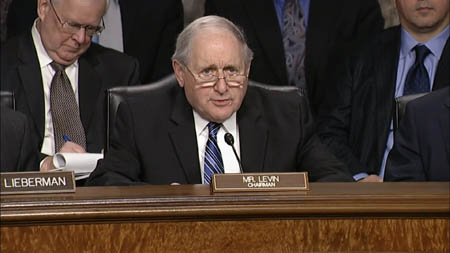 The United States must keep the option of a military strike in Syria on the table as it pursues a diplomatic deal that could potentially lead to Bashar al Assad turning over his regime’s chemical weapons to the international community, said Sen. Carl Levin (D-Mich.), Senate Armed Services Committee chairman, on Wednesday. Levin spoke with reporters in Washington, D.C., on the morning after President Obama addressed the nation, making the case for an attack on Syria, yet wanting more time to allow for a possible diplomatic solution. “This is kind of at a phase where we have the possibility of a political resolution,” said Levin. Such a solution, however, is only possible because of the military pressure that the United States has brought to bear on the Assad regime, he added. “It is not a coincidence that Russia made the proposal. It only happened because the President made the decision to take action,” said Levin. Syria giving up its weapons under international supervision is a “better outcome than what was proposed before,” he said, referring to the plan to “degrade” Assad’s military capability, but not remove his regime from power. As Congress now works to build consensus on Syria, it is important that the possibility of a military strike remains viable, said Levin during the Sept. 11 roundtable. (Levin statement)
The United States must keep the option of a military strike in Syria on the table as it pursues a diplomatic deal that could potentially lead to Bashar al Assad turning over his regime’s chemical weapons to the international community, said Sen. Carl Levin (D-Mich.), Senate Armed Services Committee chairman, on Wednesday. Levin spoke with reporters in Washington, D.C., on the morning after President Obama addressed the nation, making the case for an attack on Syria, yet wanting more time to allow for a possible diplomatic solution. “This is kind of at a phase where we have the possibility of a political resolution,” said Levin. Such a solution, however, is only possible because of the military pressure that the United States has brought to bear on the Assad regime, he added. “It is not a coincidence that Russia made the proposal. It only happened because the President made the decision to take action,” said Levin. Syria giving up its weapons under international supervision is a “better outcome than what was proposed before,” he said, referring to the plan to “degrade” Assad’s military capability, but not remove his regime from power. As Congress now works to build consensus on Syria, it is important that the possibility of a military strike remains viable, said Levin during the Sept. 11 roundtable. (Levin statement)
House, Senate Unveil Competing Proposals for 2026 Budget
July 11, 2025
Lawmakers from the House and Senate laid out competing versions of the annual defense policy bill on July 11, with vastly different potential outcomes for some of the Air Force’s most embattled programs.